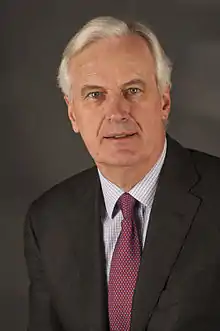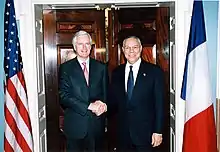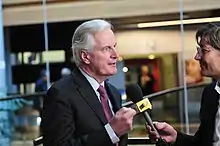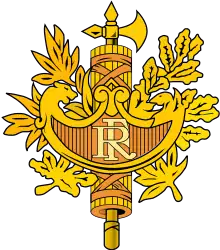Michel Barnier
Michel Barnier (French pronunciation: [miʃɛl baʁnje]; born 9 January 1951) is a French politician who served as the European Commission's Head of Task Force for Relations with the United Kingdom (UK Task Force/UKTF) from 2019 to 2021. He previously served as Chief Negotiator, Task Force for the Preparation and Conduct of the Negotiations with the United Kingdom under Article 50 TEU (Task Force 50/TF50) from October 2016 to November 2019.[1][2][3]
Michel Barnier | |
|---|---|
 Barnier in 2014 | |
| Head of the UK Task Force | |
| In office 16 November 2019 – 31 March 2021 | |
| President | Jean-Claude Juncker Ursula von der Leyen |
| Deputy | Clara Martínez Alberola |
| Preceded by | Position established |
| Succeeded by | João Vale de Almeida (As Ambassador to the United Kingdom) |
| Chief Negotiator of Task Force 50 | |
| In office 1 October 2016 – 15 November 2019 | |
| President | Jean-Claude Juncker |
| Deputy | Sabine Weyand |
| Opposite number | David Davis Olly Robbins David Frost |
| Preceded by | Position established |
| Succeeded by | Position abolished |
| European Commissioner for Internal Market and Services | |
| In office 9 February 2010 – 1 November 2014 | |
| President | José Manuel Barroso |
| Preceded by | Charlie McCreevy |
| Succeeded by | Elżbieta Bieńkowska |
| Minister of Agriculture and Fisheries | |
| In office 19 June 2007 – 22 June 2009 | |
| Prime Minister | François Fillon |
| Preceded by | Christine Lagarde |
| Succeeded by | Bruno Le Maire |
| Minister of Foreign Affairs | |
| In office 31 July 2004 – 22 February 2005 | |
| Prime Minister | Jean-Pierre Raffarin |
| Preceded by | Dominique de Villepin |
| Succeeded by | Philippe Douste-Blazy |
| European Commissioner for Regional Policy | |
| In office 13 September 1999 – 31 July 2004 | |
| President | Romano Prodi |
| Preceded by | Monika Wulf-Mathies |
| Succeeded by | Jacques Barrot |
| Minister of State for European Affairs | |
| In office 18 May 1995 – 3 June 1997 | |
| Prime Minister | Alain Juppé |
| Preceded by | Alain Lamassoure |
| Succeeded by | Pierre Moscovici |
| Minister of the Environment | |
| In office 29 March 1993 – 18 March 1995 | |
| Prime Minister | Édouard Balladur |
| Preceded by | Ségolène Royal |
| Succeeded by | Corinne Lepage |
| Member of the National Assembly for Savoie's 2nd constituency | |
| In office 12 June 1978 – 1 May 1993 | |
| Preceded by | Maurice Blanc |
| Succeeded by | Hervé Gaymard |
| Personal details | |
| Born | 9 January 1951 La Tronche, France |
| Political party | The Republicans (2015–present) |
| Other political affiliations | European People's Party Rally for the Republic (before 2002) Union for a Popular Movement (2002–2015) |
| Spouse |
Isabelle Altmayer (m. 1982) |
| Children | 3 |
| Education | ESCP Business School |
Barnier has served in several French cabinet positions including Minister of Agriculture and Fisheries from 2007 to 2009, Minister of Foreign Affairs from 2004 to 2005, Minister of State for European Affairs from 1995 to 1997 and minister of the environment from 1993 to 1995. He served at European level as European Commissioner for Regional Policy from 1999 to 2004 and European Commissioner for Internal Market and Services from 2010 to 2014. He served as vice president of the European People's Party (EPP) from 2010 to 2015.
In August 2021, Barnier announced his candidacy for President of France in the 2022 French presidential election but ultimately failed to win sufficient support at the Republicans' 2021 congress.[4][5]
Early life and education
Barnier was born at La Tronche in the French Alps, into a Gaullist family in 1951. His father was a leather and textiles craftsman.[6] In his youth, Barnier was a scout and choirboy.[6] Barnier graduated from the École Supérieure de Commerce de Paris in 1972.
Political career
National politics

.jpg.webp)

Barnier served on the staff of various Gaullist ministers in the 1970s, before being elected in 1978, aged 27, to the French National Assembly as deputy for the Department of Savoie representing the neo-Gaullists, Rally for the Republic (RPR), serving until 1993.[7][8]
Together with Jean-Claude Killy, Barnier organised the 1992 Winter Olympics in Albertville as co-president of the COJO (Comité d'Organisation des Jeux Olympiques).
Barnier first joined the French Cabinet as Minister of the Environment following the Right's landslide victory in the 1993 legislative election. In 1995, Jacques Chirac appointed him secretary of state for European affairs, serving as such until the defeat of the presidential majority in the 1997 legislative election. Barnier then served as a European Commissioner for Regional Policy in the Prodi Commission from 1999 until 31 March 2004. Then he served as Foreign Minister of France in Jean-Pierre Raffarin's government until 5 June 2005 when Dominique de Villepin replaced him with Philippe Douste-Blazy. He considered he was unjustly sanctioned for the victory of the "No" in the French referendum over the European Constitution.
In March 2006, Barnier was elected vice president of the European People's Party (EPP) for a three-year term. Under Nicolas Sarkozy's presidency, upon the reshuffle of the French cabinet, caused by the resignation of Alain Juppé after the 2007 French legislative election, he re-joined the French Cabinet as Minister of Agriculture.
In 2016, the French investigating judge Sabine Kheris requested that the case of Barnier, Dominique de Villepin and Michèle Alliot-Marie be referred to the Court of Justice of the Republic. These former ministers were suspected of having allowed the exfiltration of the mercenaries responsible for the attack on the Bouaké camp in 2004, killing nine French soldiers. The operation was allegedly intended to justify a response operation against the Laurent Gbagbo government in the context of the 2004 crisis in Ivory Coast.[9]
European politics
Barnier worked in 2006 as a special adviser to José Manuel Barroso, then President of the European Commission, and presented a report to the Council of Ministers proposing the creation of a European civil-protection force.[10] In 2006–2007, he served as member of the Amato Group, a group of high-level European politicians unofficially working on rewriting the Treaty establishing a Constitution for Europe into what became known as the Treaty of Lisbon following its rejection by French and Dutch voters.
Barnier led the UMP list in Ile-de-France for the 2009 European Parliament election. In February 2010 he was confirmed as European Commissioner for Internal Market and Services.[11][12][13] In charge of European banking system reform, he argued for a "coherent single market with intelligent rules that apply everywhere".[14]
Barnier was twice appointed Acting Commissioner for Industry and Entrepreneurship in Antonio Tajani's stead, from 19 April 2014 to 25 May 2014 while he was on electoral campaign leave for the 2014 elections to the European Parliament and from 1 July 2014 to 16 July 2014 after he took up his seat.[15][16]
As European Commissioner for Internal Market and Services, Barnier handled many important issues, such as the reform of the financial sector (40 pieces of legislation between 2010 and 2014), the banking union (starting with the Single Supervisory Mechanism) and the digital single market.[17]
From 2015, Barnier served as unpaid special adviser on European defence policy to President of the European Commission Jean-Claude Juncker.[18][19]
Brexit negotiator
.jpg.webp)
On 27 July 2016, Barnier was announced as the European Commission's chief negotiator with the United Kingdom over leaving the European Union, under Article 50 of the Treaty on European Union. Commenting on the appointment, Juncker said: "I wanted an experienced politician for this difficult job."[20]
For the 2020 Trade deal negotiation between the UK and EU, Barnier was the main negotiator,[21] who received his negotiating mandate from the European Council on 25 February 2020.[22]
Later career
In January 2021, Barnier was appointed special adviser to President Ursula von der Leyen overseeing the ratification of the EU-UK Trade and Cooperation Agreement, under new arrangements that handed responsibility for implementing the agreement to Vice President Maroš Šefčovič.[23][24]
In February 2021, Barnier set up a political faction within the Republicans under the name “Patriot and European” in preparation for a possible bid in the 2022 French presidential election.[25][26]
On 27 August 2021, Barnier launched his presidential campaign.[27] In particular, he wants a three- to five-year moratorium on immigration to the European Union.[28] He proposes to "immediately stop regularizations, rigorously limit family reunification, reduce the reception of foreign students and the systematic execution of the double penalty ". On economic issues, he wants to raise the retirement age from 62 to 65, increase the working week and tighten the conditions for access to social assistance.[29] At the party's 2021 congresse, however, he only came in third after Éric Ciotti and Valérie Pécresse; he subsequently endorsed Pécresse.[30]
Other activities
- International Olympic Committee (IOC), member of the Sustainability and Legacy Commission[31]
- Friends of Europe, member of the board of trustees[32]
Honours & Decorations
National honours
 : Officer of the Légion d'honneur
: Officer of the Légion d'honneur : Commander of the Ordre du Mérite Agricole
: Commander of the Ordre du Mérite Agricole : Commander of the Ordre du Mérite Maritime
: Commander of the Ordre du Mérite Maritime
Foreign honours
_-_ribbon_bar.png.webp) : Commander of the Order of the Oriental Republic (Uruguay)[33]
: Commander of the Order of the Oriental Republic (Uruguay)[33] : Grand Cross of the Order of Merit (Germany)
: Grand Cross of the Order of Merit (Germany) : Grand Cross of the Order of Prince Henry (Portugal)
: Grand Cross of the Order of Prince Henry (Portugal) : Grand Cross of the Order of Isabella the Catholic (Spain)
: Grand Cross of the Order of Isabella the Catholic (Spain) : Grand Cross of the Order of Merit (Italy)
: Grand Cross of the Order of Merit (Italy) : Grand Cross of the Order of the Star (Romania)
: Grand Cross of the Order of the Star (Romania) : Commander of Polonia Restituta (Poland)
: Commander of Polonia Restituta (Poland) : Knight of the Order of Orange-Nassau (Netherlands)
: Knight of the Order of Orange-Nassau (Netherlands) : Cross of Merit pro Merito Melitensi (SMOM)
: Cross of Merit pro Merito Melitensi (SMOM)
References
- "Director / Head of Service Michel Barnier". European Commission. Retrieved 29 December 2019.
- "European Commission reinforces Brexit team by setting up "Task Force for Relations with the United Kingdom" (UKTF)". European Commission. 22 October 2019. Retrieved 29 December 2019.
- De La Baume, Maïa; Barigazzi, Jacopo (21 October 2019). "Michel Barnier set to lead 'UK Task Force' in Brexit phase II". POLITICO. Retrieved 29 December 2019.
- "French presidency: Michel Barnier joins race 'to change France'". BBC News. 27 August 2021. Retrieved 27 August 2021.
- Richard Lough (2 December 2021), Pecresse emerges as favourite to win French centre-right's presidential ticket Reuters.
- Ockrent, Christine (22 January 2018). "Who is Michel Barnier? Meet the EU's chief Brexit negotiator". Prospect. Retrieved 26 October 2019.
- "VIe législature Michel Barnier". assemblee-nationale.fr.
- "Xe législature Michel Barnier". assemblee-nationale.fr.
- Benvenuto, Francesca Maria (1 April 2016). "Soupçons sur la Cour pénale internationale". Le Monde diplomatique. Retrieved 15 September 2019.
- Barnier as special adviser European Voice, 19 February 2015.
- "Michel Barnier to take over internal market portfolio". Euobserver. 27 November 2009.
- Philip Aldrick (30 November 2009). "Michel Barnier looks to calm City nerves about reform". The Telegraph. London.
- "Summary of Hearing of Michel Barnier". European Parliament. 13 January 2010. Archived from the original on 24 September 2015.
- Castle, Stephen (12 July 2013). "European Union Offers Berlin Compromise on Bank Proposal". The New York Times.
- "Six commissioners head for EU election campaign trail".
- "KUNA – Barroso announces caretaker replacements following resignation of 4 EU Commissioners". kuna.net.kw. Retrieved 3 March 2019.
- Five years of laying the foundations of new growth in Europe (PDF). European Commission. 2014.
- Special Advisers to the President, Vice-Presidents and Commissioners of the European Commission European Commission.
- Simon Taylor (9 March 2015), European Commission special advisers European Voice.
- Khan, Mehreen (27 July 2016). "Michel Barnier appointed as Juncker's Brexit chief". Financial Times. Retrieved 27 July 2016.
- Boffey, Daniel; Rankin, Jennifer (1 March 2020). "Brexit: what are the key flashpoints as EU-UK trade talks begin?". The Guardian.
- "Future EU-UK Partnership: European Commission receives mandate to begin negotiations with the UK (press release)". European Commission. 25 February 2020. Retrieved 10 March 2020.
- George Parker, Jim Brunsden and Mure Dickie), EU ‘not punishing’ UK financial services sector, London envoy insists Financial Times.
- Barbara Moens and David M. Herszenhorn (19 January 2021), Barnier moves to ‘special adviser’ as Šefčovič to become point man on Brexit Politico Europe.
- Elizabeth Pineau and Michel Rose (16 February 2021), Barnier launches political faction, fueling French presidential bid rumours Reuters.
- Elisa Braun (16 February 2021), Barnier gathers allies to support national ambitions Politico Europe.
- "French presidency: Michel Barnier joins race 'to change France'". BBC News. 27 August 2021. Retrieved 27 August 2021.
- "Michel Barnier suggère un «moratoire» de 3 à 5 ans sur l'immigration en Europe". 9 May 2021.
- "Économie, sécurité, immigration... Le programme des 5 candidats à l'investiture LR".
- Richard Lough (2 December 2021), Pecresse emerges as favourite to win French centre-right's presidential ticket Reuters.
- Sustainability and Legacy Commission International Olympic Committee (IOC).
- Board of Trustees Friends of Europe.
- "Resolución N° 939/997". www.impo.com.uy. Retrieved 27 November 2020.
.jpg.webp)
